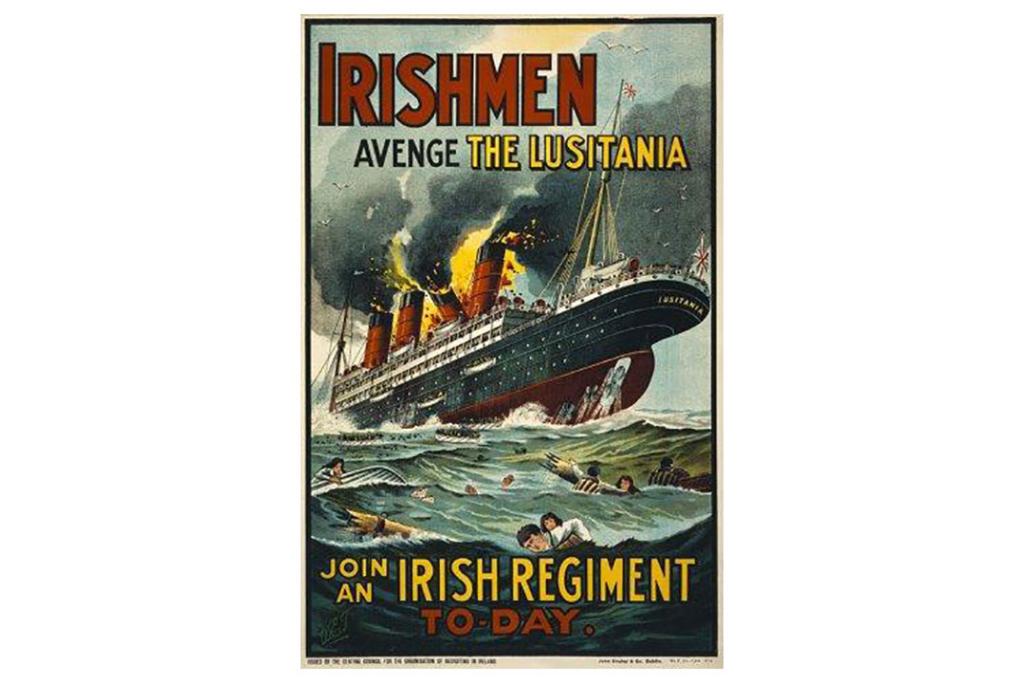Lusitania 100 years later: never forget
This is the tenth and final blog post in a series by J Kent Layton, maritime historian and author of 'Lusitania: an illustrated biography', to accompany the exhibition Lusitania: life, loss, legacy at the Maritime Museum.

Following the war, the Lusitania was used as a propaganda tool. This dramatic image shows the sinking liner,
while encouraging Irishmen to join an Irish regiment and 'avenge the Lusitania'.
© Library of Congress, Prints and Photographs Division/J Kent Layton Collection
The Titanic remains the most famous ocean liner disaster in history. Yet the sinking of the Lusitania is a subject that still fascinates us today. While both she and the Titanic suffered untimely demise, their lives and deaths could hardly have been more dissimilar. The Titanic was a new ship on its maiden voyage, while the Lusitania had put in 7½ years of hard work on the Atlantic. The Titanic disaster began with a quiet bump in the night and played out slowly over almost three hours; the Lusitania disaster happened in broad daylight, and quite literally began 'with a bang'. The speed with which she sank—nearly nine times that of the sinking of the Titanic—left no time for the band to play and calm passengers, for men to bid their wives tearful farewells and tell them that everything would be all right in the morning, and in many cases did not even leave time for family and friends to even find each other before the ship sank. The Titanic disaster was the result of overconfidence, of proceeding according to normal practice until the situation seemed to dictate a deviation; on the other hand, the Lusitania disaster was the result of war—it was a cold, calculating decision made by the captain of an enemy submarine as he stalked his prey through a periscope. Both catastrophes were preventable, but only one was a deliberate attack. Perhaps it is all of her differences from the Titanic that make the Lusitania's story so captivating.
Another propaganda poster encourages people to
'Remember the "Lusitania' and enlist in the war effort.
© Library of Congress, Prints and Photographs Division/J Kent Layton Collection
The world has never recovered from The Great War. It set the stage for a much worse Second World War. The Cold War, and even much of the turmoil in the Middle East today, can all be traced back to 'firebreaks' which gave way during that 1914-1918 conflict. When the war began, people still believed that there was some civility in the world of warfare, and that civilians could be shielded from harm during a conflict; when the war ended, no one could ever realistically expect civility in a war. The Lusitania's sinking was perhaps the most shocking 18 minutes of the 20th century up to that afternoon; while far worse crimes against humanity and civility have been perpetrated since, the loss of the Lusitania was a watershed moment in human history.
Today, just over a century later, we recall the sinking of the Lusitania and the lives of so many that were cut short, and of the lives that were forever changed through that event. We remember the people who were aboard, and their stories, and the story of one of the greatest liners in world history. We pause to remember, lest we forget the dark deeds that mankind is truly capable of, lest we forget how quickly innocence can be shattered and of how quickly our lives can be changed, and lest we forget how easy it can be for people to justify horrific acts. We remember even as we press on into our own uncertain futures, hoping that we and our loved ones are never faced with that sort of tragedy. We also hope that we can keep our own moral compass guiding us properly through life, and try never to repeat the mistakes made by those who have gone before us. The Lusitania's life and tragic loss must never be forgotten.

